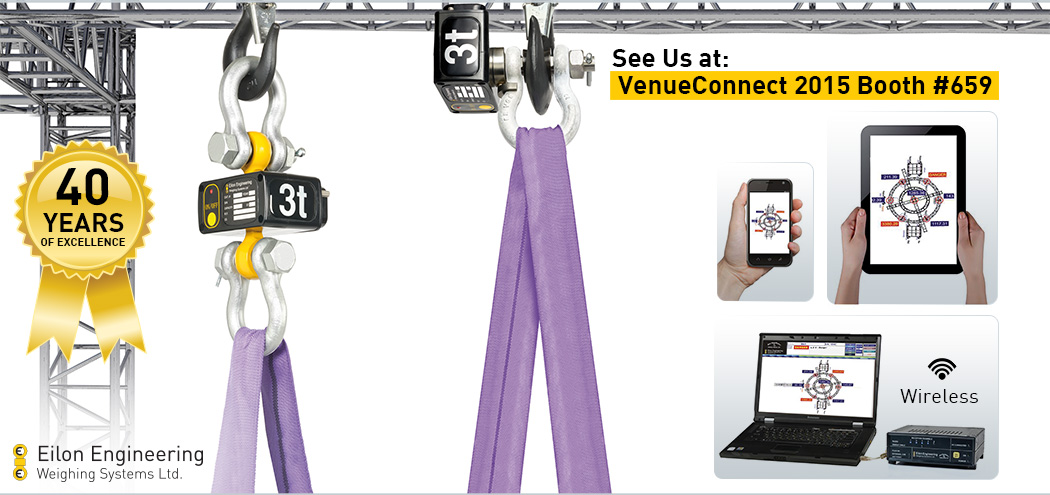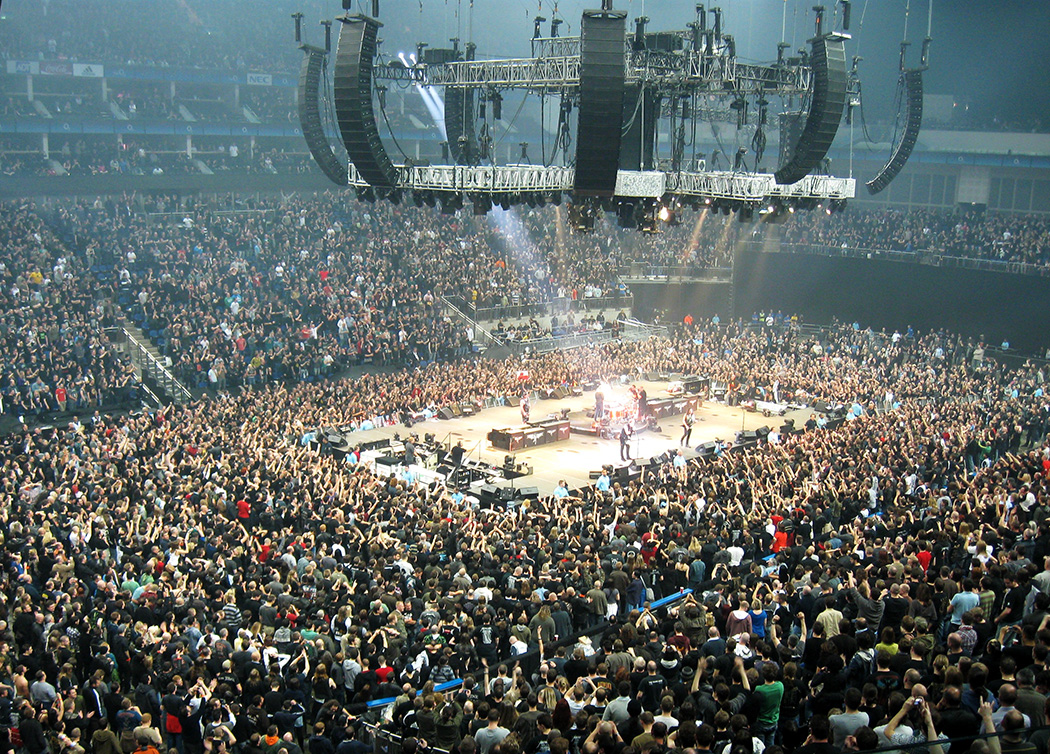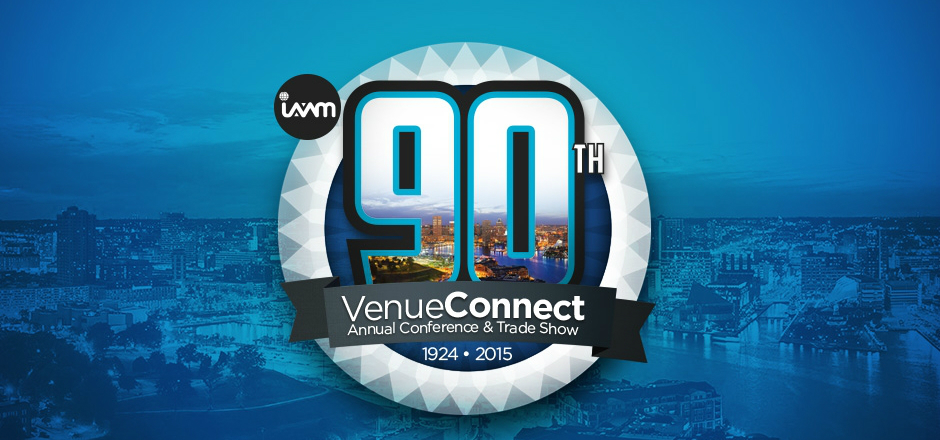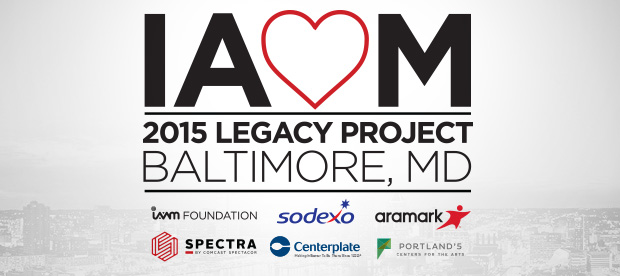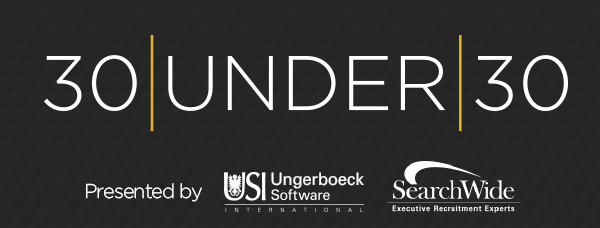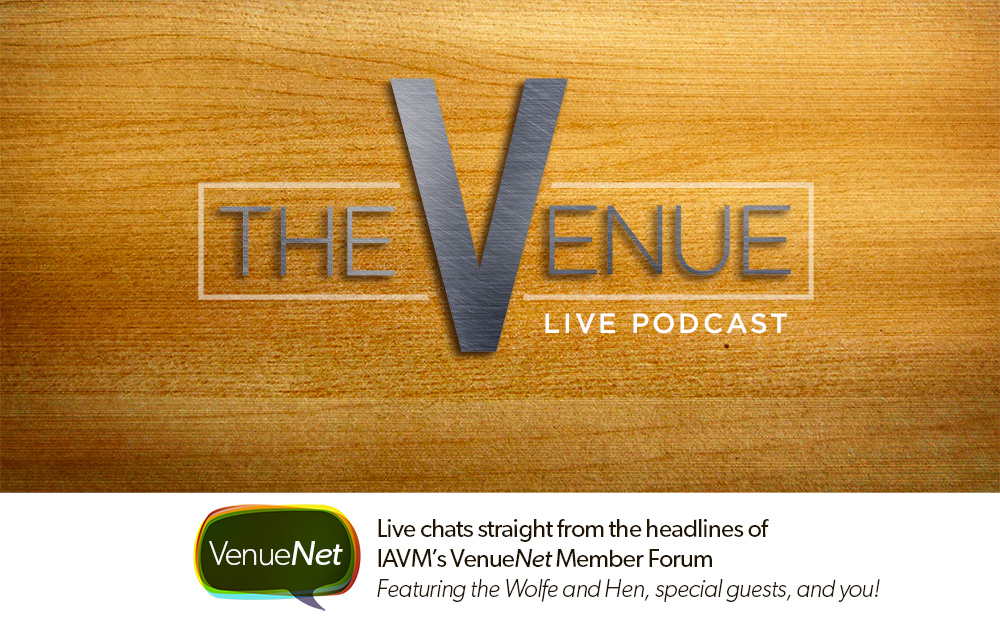Sponsored Story: Load Monitoring in Venues – Improve Safety, Space Utilization, and Revenues
Why is load monitoring so important?
Tens of tons of equipment are hung above people in live events.
Anytime a load is suspended using multiple lift points there exists the potential for a structure to become “statically indeterminate,” making it impossible to calculate the loads on each point; this is known as unpredictable load distribution. Even if a truss/structure appears to be leveled, it is no indication that it is balanced from a load distribution point of view; these circumstances can easily lead to an overload. This is dangerous and in extreme cases can result in truss collapse. The combination of enormous loads suspended above people and the potential for unpredictable load distribution creates an absolute necessity for load monitoring.
For more information on unpredictable load distribution, click here.
Load monitoring systems, like the Ron StageMaster detects all overloads, including those caused due to unpredictable load distribution, and thus prevents potential accidents. They enable the rigger to take immediate preventive actions and balance the load before an overload can occur. Load monitoring systems can also provide “black box” capability, allowing operators to analyze months worth of load data and history.
Beyond Safety – Benefits
The Ron StageMaster can do a lot more than protect people, venue infrastructure, and expensive equipment. Constantly monitoring loads on stage can allow venues to host larger, heavier, more dynamic shows and widen the scope of their activities. Being protected from overload accidents can protect the venue from potential litigation, damages, reputation risk, and prevent costly shut-downs and downtime. Some current StageMaster operators have also increased their revenues by allowing customers to pay for load cell use, and some customers report increases of $500,000 or more per each hall or venue. Ownership of a sophisticated load monitoring system also shows customers that a venue is safety oriented and an adopter of the latest technologies.
The Load Monitoring Revolution
Eilon Engineering launched the first generation of the Ron StageMaster in 2006 after many years of developing cutting edge load monitoring solutions for customers like NASA, Boeing, and Lockheed Martin. Since then, the Ron StageMaster has been adopted by some of the most prestigious venues, tours, and rigging companies including: The Orange County Convention Center, The Boston Symphony, The AT&T Performing Arts Center, The Royal Shakespeare Company, and many others.
As awareness of the problem of unpredictable load distribution grows, so will the use of load monitoring systems like the Ron StageMaster. In some countries legislation has even been enacted requiring riggers to confirm the weight of each and every load that will be suspended above people. Continuous load monitoring allows these riggers to streamline their operation and measure the weight of each and every piece of equipment while lifting. It is only a matter of time before load monitoring systems become a regulated requirement for any venue that suspends equipment above people.
See us at VenueConnect 2015, Booth #659.
Eilon Engineering – Who We Are
Ron StageMaster – Safety Above All
More Education for Your Time
Time is one of the world’s most cherished commodities, and when attending a conference, time is one thing you wish you had more of. Because of that, we’re offering VenueConnect attendees several sessions and interactive round tables that are short on time but big in content.
Let’s take a look at some selected sessions.
Sodexo Composting Mini Session
Saturday, August 1, 5:10-5:25 p.m.
IAVM Membership Booth
Mike Tully, national executive, Sports, Entertainment & Gaming, Sodexo
Sustainability is about protecting the world for future generations. Food waste is a growing global problem of breathtaking scope and is the single greatest contributor of American landfills. Visit the IAVM Membership booth to learn how composting can be part of the solution to solving the food waste crisis.
Green Sports Alliance Mini Session
Sunday, August 2, 12:20-12:35 p.m.
IAVM Membership Booth
David Muller, membership director, Green Sports Alliance
The Green Sports Alliance Greener Cleaning Playbook is designed to help sports facilities reduce the health and environmental threats associated with cleaning sports venues. Beyond protecting health, the cleaning industry uses significant quantities of chemicals, paper products, cleaning equipment, plastic liners for waste receptacles, and other supplies. Visit the IAVM Membership booth to learn how your venue can reduce operating expenses and health risks to cleaning staff, athletes, and fans by greening their cleaning program.
In addition to the mini sessions on the trade show floor, attendees are encouraged to participate in Spark: Small Tables, Big Topics. These interactive round tables take place on Monday, August 3, 8:30-9:45 a.m. Attendees can move from table to table based on their interests. Here is just a sampling of the many topics to be discussed:
Cloud Based Parking Technologies
Dance Flooring
Motorized Rigging—Pros and Cons
Selling Your Alternative Space
Measuring the Effectiveness of Your Leadership
You can view the full lineup on the VenueConnect schedule. See you in Baltimore!
IAVM Loves Baltimore!
“The only thing you take with you when you’re gone is what you leave behind.” — John Allston
The IAVM Foundation Legacy Project offers you the opportunity to work together with your industry peers to leave a lasting legacy of caring and support in our host city.
As chair of the IAVM Foundation Legacy Project, I invite you to join us as we make a difference in the Baltimore community. We’ve teamed up with the United Way of Central Maryland for a “Stone Soup Event.”
As the Stone Soup story goes, a stranger enters a village. After being told by all the villagers that there is no food to eat, he puts a pot of water on a fire to boil and places a big stone into the pot. The villagers grow curious. One by one, they begin contributing one ingredient each, until they have assembled a hearty soup for all to feast on.
The United Way movement was founded on this concept: that each one of us can give, advocate, and volunteer to improve conditions in our communities.
This year, with the record-breaking number of volunteers already signed up, VenueConnect attendees will be making over 200 casserole dishes that will create 1,600 individual servings and feed up to 125 families. This IAVM Foundation Legacy Project couldn’t happen without your compassion for giving and serving others—thank you. It is not too late to join us. If you haven’t yet registered, please contact Sarah Rogers with the IAVM Foundation to sign up.
I’d like to give very special thanks to our outstanding sponsors—Aramark, Centerplate, Portland’5, Spectra, and Sodexo. These companies already generously feed the spirit of the venues and communities they serve, and we are blessed by their willingness to step up and support the IAVM Foundation Legacy Project. To all of you, thank you—we admire and honor your servant leadership and appreciate your loyalty to IAVM and its members.
IAVM Foundation Legacy Project Event Details:
Event Location: Matthew A. Henson Elementary School
Date + Time: Friday, July 31, 10 a.m. – 2 p.m.
Bus Transportation provided for all attendees.
For questions regarding the project or to sign up, please contact Sarah Rogers at sarah.rogers@iavm.org.
30|UNDER|30 Spotlights: Covart, Feinstein, Lekhy, and Shreve
This week’s spotlight of recipients in the IAVM Foundation’s inaugural class of 30|UNDER|30 are asked, “As a future leader, what areas do you deem necessary for future success in this competitive industry?”
 Kelsey Metzger Covart
Kelsey Metzger Covart
Sales and Event Manager
Ames Center
Burnsville, Minnesota
“I think it’s important to keep up with the ever-changing trends as well as having a firm foundation of what built this industry. Things like VenueConnect—and other continuing education opportunities—are important, because it gives us a chance to work with the industry’s leading professionals and to network with our peers to see what works for them and other best practices. It’s also important to stay connected to the communities we serve, whether that is working with the convention and visitors bureau, the chamber of commerce, or just being involved in the community. This truly lets us see what the community wants in terms of programming and products. One also has to have a strong passion for this industry to succeed. It’s such a crazy, ever-changing industry that without a deep love for it one can’t be successful.”
 Sari Feinstein
Sari Feinstein
Events Supervisor
Wells Fargo Center for the Arts
Santa Rosa, California
“A motivation to learn from those around you is necessary for future success in this competitive industry. Future leaders need the spark to continue to grow with the times, look at those venues around us, and learn from their successes and their downfalls. One venue does not have all the answers, and curiosity is essential.”
 Nikki Lekhy
Nikki Lekhy
Program Associate
Cultural Tourism DC
Washington, D.C.
“We are a flexible and adaptable industry, and I think it’s necessary to use our comfort in change as an opportunity to change the role that we play in the communities we serve. Future success in this industry takes a willingness to try new things and to create opportunities that affect more than our own bottom line.”
 Andrew Shreve
Andrew Shreve
Assistant Box Office/Parking Manager
Global Spectrum – Greater Richmond Convention Center
Richmond, Virginia
“I believe one key to staying competitive is seeking out traditional and non-traditional marketing tactics, utilizing social media such as Facebook, Twitter, Foursquare, and maintaining user-friendly content. It’s a great way to promote an upcoming show, an upcoming convention, or even the venue itself.”
Please Join Us for a New Episode of The Venue
We’re having fun producing our monthly podcast, The Venue, and we hope you join us this Friday, July 24, at 2 p.m. (CST) for another episode.
You can register at this link: https://attendee.gotowebinar.com/register/50090377894186342
We’ll be joined by our guest host, IAVM Chair Kim Bedier, CFE, and we’ll discuss a variety of topics, such as SMART goals for part-time/front-of-house employees, John Oliver’s editorial on publicly funded stadiums and arenas, VenueConnect, and bacon-flavored seaweed.
We hope you join us on Friday by calling in or listening, and please take a moment to listen to the first episode and the second episode.
Do you want to receive a Front Row News weekly digest?
Categories
- Allied (856)
- Architecture (147)
- Arenas (744)
- Career (890)
- Convention Centers (889)
- Education (608)
- Events (1,528)
- Food & Beverage (193)
- Foundation (113)
- Guest Experience (1,482)
- Industry News (2,253)
- Leadership (1,872)
- Marketing (150)
- Membership (1,985)
- Music (212)
- Performing Arts Centers (453)
- Professional Development (398)
- Research (127)
- Safety & Security (425)
- Sports (763)
- Stadiums (607)
- Student (159)
- Technology (515)
- Ticketing (92)
- Touring (82)
- Trends (357)
- Uncategorized (771)
- Universities (216)
- Video (25)
- Young Professional (198)
Twitter Feed
- Twitter feed loading
Recent Posts
- GEODIS Park Selects Allied Universal As Its Preferred Event Services Provider
- Venuworks Appoints Marc Solis as Executive Director of the Fresno Convention and Entertainment Center
- Los Angeles Convention Center Diverts 8,000 Pounds of Wood Waste to Local Foundation Supporting Fire Victims
- Fort Worth Unveils Plans for Phase 2 of Convention Center Transformation
- San Diego Convention Center CEO Announces Retirement After a Decade of Leadership
Categories
- Allied
- Architecture
- Arenas
- Career
- Convention Centers
- Education
- Events
- Food & Beverage
- Foundation
- Guest Experience
- Industry News
- Leadership
- Marketing
- Membership
- Music
- Performing Arts Centers
- Professional Development
- Research
- Safety & Security
- Sports
- Stadiums
- Student
- Technology
- Ticketing
- Touring
- Trends
- Uncategorized
- Universities
- Video
- Young Professional
Archives
- February 2026
- January 2026
- December 2025
- November 2025
- October 2025
- September 2025
- August 2025
- July 2025
- June 2025
- May 2025
- April 2025
- March 2025
- February 2025
- January 2025
- December 2024
- November 2024
- October 2024
- September 2024
- August 2024
- July 2024
- June 2024
- May 2024
- April 2024
- March 2024
- February 2024
- January 2024
- December 2023
- November 2023
- October 2023
- September 2023
- August 2023
- July 2023
- June 2023
- May 2023
- April 2023
- March 2023
- February 2023
- January 2023
- December 2022
- November 2022
- October 2022
- September 2022
- August 2022
- July 2022
- June 2022
- May 2022
- April 2022
- March 2022
- February 2022
- January 2022
- December 2021
- November 2021
- October 2021
- September 2021
- August 2021
- July 2021
- June 2021
- May 2021
- April 2021
- March 2021
- February 2021
- January 2021
- December 2020
- November 2020
- October 2020
- September 2020
- August 2020
- July 2020
- June 2020
- May 2020
- April 2020
- March 2020
- February 2020
- January 2020
- December 2019
- November 2019
- October 2019
- September 2019
- August 2019
- July 2019
- June 2019
- May 2019
- April 2019
- March 2019
- February 2019
- January 2019
- December 2018
- November 2018
- October 2018
- September 2018
- August 2018
- July 2018
- June 2018
- May 2018
- April 2018
- March 2018
- February 2018
- January 2018
- December 2017
- November 2017
- October 2017
- September 2017
- August 2017
- July 2017
- June 2017
- May 2017
- April 2017
- March 2017
- February 2017
- January 2017
- December 2016
- November 2016
- October 2016
- September 2016
- August 2016
- July 2016
- June 2016
- May 2016
- April 2016
- March 2016
- February 2016
- January 2016
- December 2015
- November 2015
- October 2015
- September 2015
- August 2015
- July 2015
- June 2015
- May 2015
- April 2015
- March 2015
- February 2015
- January 2015
- December 2014
- November 2014
- October 2014
- September 2014
- August 2014
- July 2014
- June 2014
- May 2014
- April 2014
- March 2014
- February 2014
- January 2014
- December 2013
- November 2013
- October 2013
- September 2013
- August 2013
- July 2013
- June 2013
- May 2013
- April 2013
- March 2013
- February 2013
- January 2013
- May 2012
- March 2012
- December 2011
- November 2011
- October 2011
Recent Comments
- Frank Bradshaw, Ph.D., CVE on John Meyer, CVE, a Tireless Advocate of Certification for Venue Professionals, Has Died
- Neil Sulkes on Hilary Hartung, Friend to Many in Venue Marketing, Has Left Us
- Jason Parker, CVE on The Devastation of Hurricane Helene and How We Can Support One Another
- Larry Perkins on Touhey Testifies Against Speculative Ticketing Before Congressional Subcommittee
- Peter Secord on Major Players for Planned Elkhart Amphitheater Were in the Mix at VenueConnect

